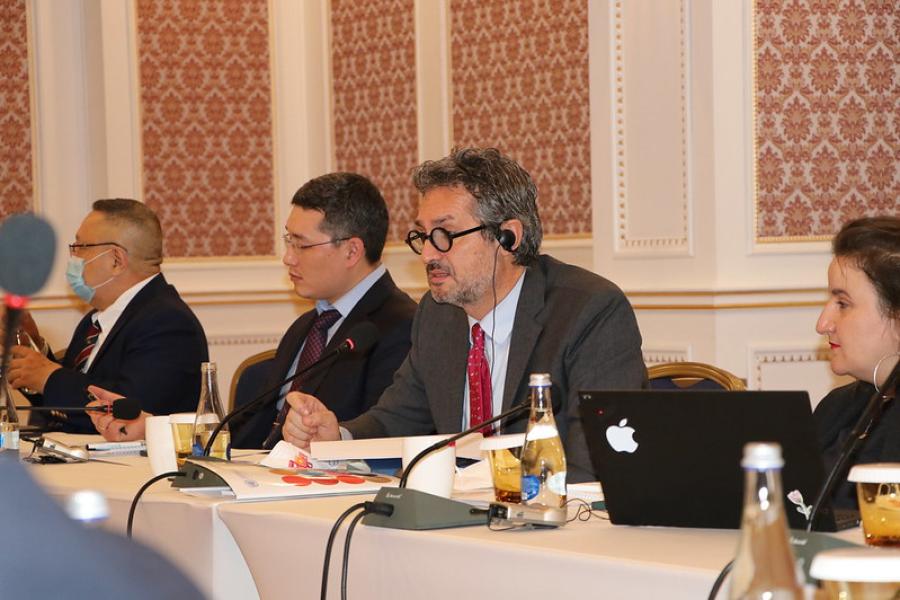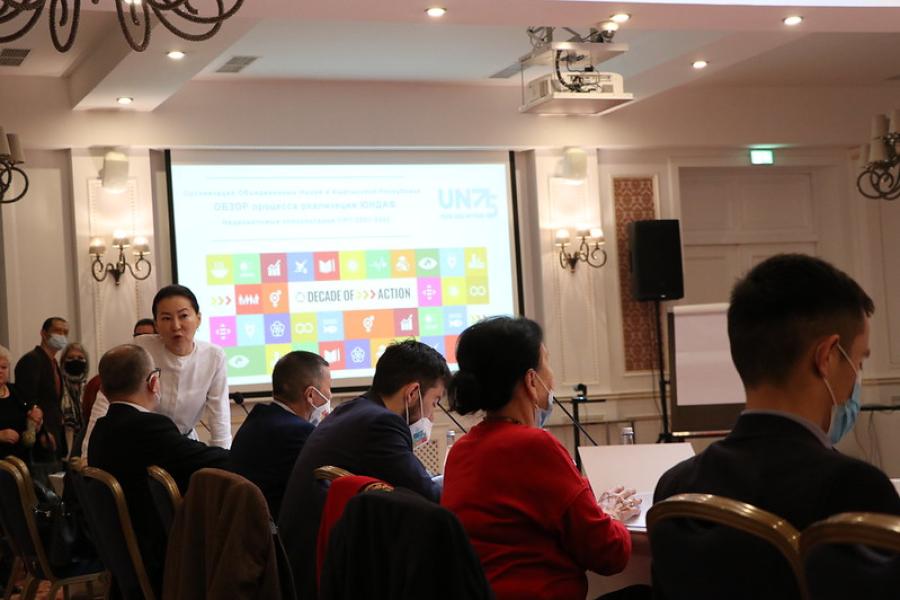UN and National Partners Discuss UNDAF Joint Work Plans for 2021-22: Sustainable and Inclusive Economic Growth
26 March 2021
On 26 March 2021, the UN agencies and various partners and stakeholders met to discuss UNDAF Priority Area I "Sustainable and inclusive economic growth, industrial, agricultural development, food security and nutrition".

In his opening remarks, Andrea Bagnoli, WFP Representative and Chair of the UNDAF priority area I, noted the importance of this priority area to recover from the pandemic, which proved to be more than a health crisis, but also socio-economic one.
The current UNDAF was signed with the Government in 2017 for 2018 and 2022, covering four thematic priorities:
- Sustainable and Inclusive Economic Growth;
- Good Governance, Rule of Law, Human rights, and Gender Equality;
- Environment, Climate Change, and Disaster Risk Management;
- Social Protection, Health and Education;
The UN committed in 2017 that by the end of 2021 it would try to mobilize 221.1 million USD as the UN contribution to the development in the Kyrgyz Republic, by supporting the Government in realizing the national development strategies through a whole-of-government and a whole-of-society approach to achieve Sustainable Development Goals and ensure that no one in the Kyrgyz Republic is left behind.
Aziz Azamatov, Head of the Sector for Coordination of Foreign Aid in the Department of Economics and Investments, Office of the Government of the Kyrgyz Republic, informed that at this time work has begun on the development of medium-term priorities for the Kyrgyz Republic until 2026, and noted the importance of harmonizing these priorities with the UNDAF plan. Mr. Azamatov urged to pay special attention to the economic component of the UNDAF, due to the COVID situation, the economic sector has become vulnerable and needs comprehensive support. He also emphasized the importance of working to strengthen the social orientation of domestic business in the field of corporate social responsibility and social entrepreneurship. He urged to pay attention to practical measures in the second biennial work plan and, in conclusion, expressed confidence in the further development of fruitful and coordinated cooperation between the Government of the Kyrgyz Republic and UN agencies.
Marat Usupov, Country Representative of the United Nations Industrial Development Organization, presented a report on the activities within the framework of UNDAF priority I. Despite the difficult situation associated with the pandemic last year, the UN system continued to provide uninterrupted assistance to the Government of the Kyrgyz Republic. In particular, in the first priority area, monitoring and analysis of the impact of the pandemic on labour markets, work to support businesses to create jobs, the development of domestic producers, training of the population to improve employment opportunities, support of business relations between exporters and manufacturers, support of vulnerable groups of the population through the provision of food aid; and agricultural production support. A total of 12 UN agencies are contributing to the achievement of 3 intermediate results of this priority. Marat Usupov noted the involvement of a wide range of partners from ministries and agencies, local authorities and civil society, academic and private sectors in the implementation of this strategy. Then he introduced the list of events planned for 2021-2022 and noted the importance of coordinated actions in achieving the indicated results and urged the participants to make all the necessary efforts to achieve the set goals.
Abdybek Asanaliev, Dean of the Faculty of Agronomy and Forestry, KNAU named after K.I. Scriabin, stressed that last year, as a result of the pandemic, the number of vulnerable people both in rural areas and in cities increased, resulting in a large pressure on the environment, so it is important to reconsider plans and priorities. He also noted the importance of introducing nutrition sensitive agriculture, as it is widely used in developed countries.

According to the food security and nutrition program (2019-2023), which covers the entire country, he noted that it is important to develop a local food security and nutrition program at the aiyl okmotu level based on the resources of the cultivated area and livestock. He also expressed his opinion on clear indicators for tracking the progress of the program for its contribution to country development and on the expenditure of funds from the Government.
Andrea Bagnoli, Chair of UNDAF Working Group 1, commented that one of the goals of Priority I is also to ensure rural development, food security and nutrition for all, which is important in a country where more than 60% of the population lives in rural areas and therefore in in the face of multiple needs and limited resources, efficient allocation and direction of available resources is essential. He noted the Government's efforts to stabilize market prices and food access and availability, as well as the role of the private sector in accelerating rural and economic development. Together with the Ministry of Agriculture, Water Resources and Regional Development and the Ministry of Health and Social Development, WFP, FAO and the International Fund for Agricultural Development (IFAD) continue to work at the central and local levels to develop plans for rural development and food security and nutrition and to improve access to food without leaving the most vulnerable behind.
Concluding the meeting, Andrea Bagnoli stated that the existing National Development Strategy and various ministerial technical strategies under revision or development are an additional opportunity to address government priorities and work out how the UN system can support these government priorities and how to ensure full involvement of civil society and the private sector. This biennial plan will also serve as the basis for a new development framework for the next 5 years, so the implementation process needs to learn lessons and examine gaps and best practices for the successful implementation of the next 5-year plan.
This discussion is part of the ongoing consultations with the line ministries on UNDAF Joint Work Plans (JWPs) for 2021 and 2022, which will be presented to the UNDAF Steering Committee, chaired by the Prime Minister and UNRC, in spring 2021.









